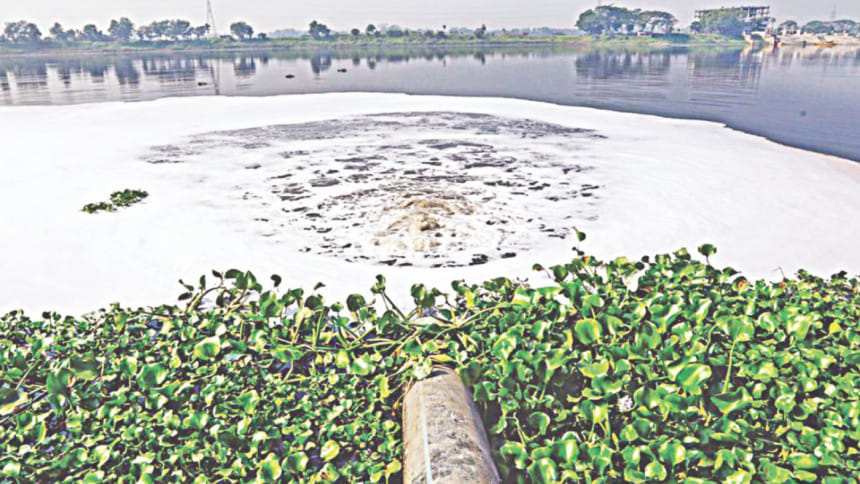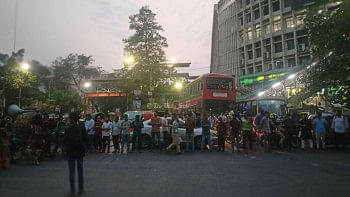Water pollution: Solutions that actually work

AS the incumbent Awami League government gears up for crucial parliamentary elections to test its popularity, it continues to face numerous questions about its administrative successes and failures. Amongst its many achievements, curbing pollution is definitely not one. In reality, the problem seems to be getting worse. Since the independence of Bangladesh, no government has been able to effectively tackle issues related to pollution. And one of the reasons why there has been a growing call for decentralisation of major cities is the high level of water pollution in the cities.
While air pollution remains the topmost silent killer of citizens (it contributed to the death of 6.5 million people, mostly in newly industrialised countries such as Bangladesh, in 2015)—water pollution, especially in Dhaka, has presented itself as a very serious problem. A city of nearly 20 million inhabitants, Dhaka faces challenges on this front, ranging from inadequate sanitation, polluted rivers, and chemical outpouring from the surrounding industries, all resulting from the unplanned nature of urbanisation.
The development of brickfields around the city, the presence of tanneries that dump chemical waste into water bodies, river grabbing, and growing industries around the city, are contributing to the unplanned urbanisation. Yet, the macroeconomic objective of environmental protection is being ignored. Our rivers are dying, the fish rotting away—a classic example being Buriganga river. Dhaka is one of the least liveable cities in the world, according to several international organisations, with water pollution being one of the major contributing reasons. The problems are there for us all to see. But we need solutions that actually work.
One of the things that the recently deceased Mayor of Dhaka, the iconic Annisul Huq, did was seek advice from noted architects and city planners as to what approaches to take to make Dhaka more liveable. Dhaka's residents warmly appreciated his efforts. Therefore, recognising the frailties of this city, and prioritising a "Green Dhaka, Clean Dhaka" campaign across the political class, must take a front seat in the upcoming Mayoral elections. Furthermore, the central administration should pursue a policy of mobilising state resources to target ambitious annual reductions in water pollution levels, with the advice of city planners, while simultaneously conjoining this with a rapid de-urbanisation campaign.
The recent appointment of the renowned ICT entrepreneur Mustafa Jabbar to the Cabinet portfolio of Post, Telecommunication and Information Technology, showcases the kind of approach and recognition that are needed by those who wield power, to allow noted technocrats with experience in their relevant fields to handle pertinent state issues, which they have studied and provided solutions to throughout their careers. The same approach should be taken when dealing with Dhaka's problems, particularly urbanisation and pollutions, by bringing in people with experience in this field.
In terms of legislation, as is the case with many cases in Bangladesh, there are enough laws but those are not monitored or implemented. The state needs to make greater efforts to monitor pollution levels, and punish the offenders financially, whether they be RMG producers or small tanneries. Taxing the offenders, subsidising eco-friendly initiatives, and enhancing accountability are some simple primary policies, yet important for Bangladesh in affecting a change. From a broader perspective, our country needs to enhance resources specifically targeted at improving the occupational and geographical mobility of labour. That is, the state needs to create a forum to make it viable and attractive for people to consider moving in between jobs carrying different skills, and within different geographical regions. The lucrativeness, whether stemming from financial incentives or access to resources, of moving a tannery from Narayanganj to an eco-friendly designated zone in Mymensingh, for example, will push businesses to reconsider their business models, and consider the move more effectively.
Only then will we see an organic reduction in water pollution levels in the rivers of Dhaka city. As such, reallocation of resources and areas of business remains a cornerstone in the fight to reduce pollution levels.
Another approach used by governments around the world, including Malaysia, has been the reallocation of state institutions to new capital cities. While the idea of naming a new administrative capital for Bangladesh might be novice to most people, it is a thought that should be considered. In such a model, offices of all state administrative bodies, including ministries, secretariats, government agencies, etc. would have to be reallocated to a new designated capital city. Reallocation of the main airport and central offices of the Prime Minister and the President are all options that should be considered. While it may sound radical in nature, it may be necessary given that the problems arising from Dhaka's unplanned growth, if unchecked, are going to cause devastation in the long run. The citizens of this country are already suffering terribly as a result of that.
Colon cancer, asthma, kidney problems, maternal health issues, diarrhoea and many other health concerns are a direct result of city-wide water pollution. Air pollution has been statistically proven to actually kill human beings, especially new-born babies, through lung problems and asthma. Bangladesh is a proud country, and yes, we should surely be proud of what we have achieved. However, this cannot deter us from looking at what more we can achieve as a society. Something must be done immediately to decentralise Dhaka city. We have repeated this for some time now. All problems of congestion, pollution and poor living standards stem from the notion of an overly dense Dhaka. It is difficult to save Dhaka at this point, hence alternatives should and must be considered for the future of this country.
Mir Aftabuddin Ahmed is a student of economics and international relations at the University of Toronto, Canada.
Email: aftab.ahmed@mail.utoronto.cam





Comments